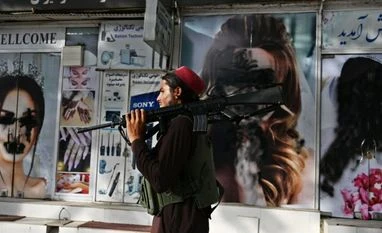In Afghanistan, grooving to your favourite tunes, enjoying a hookah session, or flaunting a ‘Western haircut’ can land you in serious trouble. The Taliban’s strict regime has turned everyday pleasures into punishable offences, as highlighted in a recent United Nations (UN) report.
The UN Assistance Mission in Afghanistan (UNAMA) released a report on Tuesday, revealing how the Taliban’s morality police have clamped down on human rights, creating a pervasive “climate of fear and intimidation”, especially for women and girls.
Ministry of morality
The Taliban’s Ministry of the Propagation of Virtue and the Prevention of Vice (MPVPV), established in 2021, enforces the group’s stringent interpretations of Islamic law. This includes a ban on ‘un-Islamic’ activities like displaying images of humans and animals, celebrating Valentine’s Day, and more.
The Taliban’s directives, often communicated verbally, are unpredictably and inconsistently enforced, adding to the chaos.
When the Taliban returned to power in August 2021, following the hasty withdrawal of US-led troops, they initially promised a more moderate rule compared to their harsh regime in the 1990s. However, the UN report shows a return to the old ways, with severe restrictions reminiscent of that era, despite earlier assurances to respect women’s rights within the framework of ‘Islamic law’.
Between August 2021 and March 2024, the UN documented over 1,000 incidents of violence by Taliban officers to enforce their rules. The MPVPV uses various methods, including verbal intimidation, arrests, detentions, ill-treatment, and public lashings.
Women under siege
The report also highlights the Taliban’s oppressive actions against women, which some UN officials say could amount to ‘crimes against humanity’.
More From This Section
Women face strict dress codes and restricted access to public places. Women-owned businesses have been shut down, appearing in movies is forbidden, beauty salons are closed, and access to birth control is limited. Women are also banned from parks, gyms, and public baths, and must have a male guardian when travelling more than 48.5 miles (78 kms) from home.
Men are not exempt from these rules, facing regulations on beard length and hairstyles. In December 2023, the morality police closed 20 barbershops in one night for offering Western-style haircuts. Barbers were reportedly detained until they promised to stop offering such haircuts.
Legal obligations ignored
Afghanistan, being a signatory to seven international human rights treaties, is legally obligated to protect its citizens’ rights. However, the Taliban’s rules violate numerous human rights, including the right to work, freedom of movement, expression, and reproductive rights. The Taliban dismissed the UN’s criticism as ‘unfounded’, claiming it was based on a Western perspective and that Afghanistan should be assessed as a Muslim society.
The Taliban also forbids the public display of human and animal images, leading to the removal of advertisements and the covering of shop mannequins. Media in the country is heavily restricted, and people live under constant surveillance, with their phones, cars, and mosque attendance being monitored.
In June 2024, Taliban officials met with top UN representatives in Qatar, sparking outcry from human rights groups as Afghan women were excluded from the talks. Rosemary DiCarlo, the UN’s under-secretary-general for political and peace-building affairs, emphasised that Afghan women’s concerns were a focal point of the discussions.
)